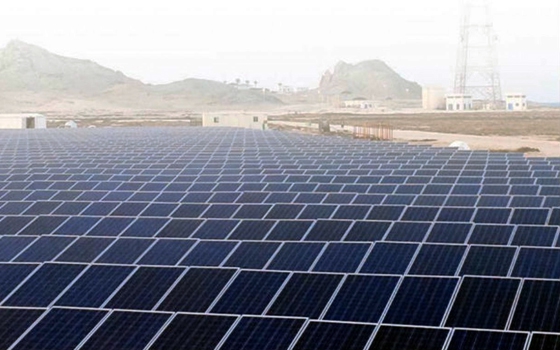Top UAE renewable energy company Masdar said it has signed a power purchasing agreement with the Jordanian government for a 200-megawatt (MW) solar power plant near capital Amman.
The photovoltaic (PV) project will be the country's largest solar power plant, said Mohamed Al Ramahi, the chief executive of Masdar, after signing the deal with Abdul Fattah Daradkeh, the chief executive of National Electric Power Company, Jordan’s state electricity provider, in the presence of Dr Hani Al Mulqi, Prime Minister of Jordan.
The agreement to develop a PV plant follows the inauguration of the 117 MW Tafila wind farm in Jordan in December, the first utility-scale wind project in the Middle East and North Africa (Mena) region.
Tafila was developed by Jordan Wind Project Company, a partnership between InfraMed (50 per cent), Masdar (31 per cent) and EP Global Energy (19 per cent).
With this agreement, a major step has been taken towards the development of the largest solar power plant in Jordan, stated Al Ramahi.
The signing ceremony held at Amman was also attended by Dr Omar Malhas, Finance Minister; Dr Mohammad Al Momani, Minister of State for Media Affairs and Communications and Jordan’s Government spokesman; Fawaz Najib Irshaidat, Jordan’s Minister of State for Prime Ministerial Affairs; Ahmed Saeed Al Calily, the chief executive of Mubadala Development Company’s energy platform; and Moeen Sayegh, the director general of Jordan’s Department of Land and Survey.
The announcement follows an agreement between Jordan’s energy ministry and Masdar on the development, ownership, operation and maintenance of the country’s largest solar power facility signed at Abu Dhabi Sustainability Week 2016 in January.
The wholly-owned Masdar subsidiary Baynouna Solar Energy Company (BSEC) has been set up to expedite the project.
Speaking at the ceremony, Dr Ibrahim Saif, Jordan’s Minister of Energy and Mineral Resources, said: "Today’s signing marks the forward progress of a significant investment in Jordan’s energy security in line with His Majesty King Abdullah II’s vision to diversify the country’s energy mix and to meet future domestic power demand growth through sustainable sources."
Jordan’s largest solar power plant will be linked to Al Muwaqqar substation located 10 km outside Amman. Once connected to the national grid, it will cater to the annual power needs of around 110,000 homes and displace an estimated 360,000 tonnes of carbon dioxide emissions each year.
“The solar power plant will raise the international profile of Jordan as a key destination for utility-scale renewable energy projects, stimulate local job creation and knowledge transfer, and further incentivize the adoption of commercial clean energy in the Mena region,” he added.
Dr Sultan Ahmed Al Jaber, UAE Minister of State and chairman of Masdar, said this deal further strengthens the deep-rooted co-operation between Jordan and the UAE and builds on the success of the region’s first utility-scale wind farm that Masdar and its partners inaugurated in the kingdom last year.
“Meeting the region’s growing demand for power will require a diverse range of energy sources, and this solar project reinforces the role of renewable energy as an efficient and cost-effective contributor to the global energy mix,” stated the minister.
“Since Masdar’s establishment a decade ago, its vision has been to advance the clean energy industry and to provide sustainable, innovative solutions to the world’s growing energy needs,” noted Dr Al Jaber.
“Today, that vision is being translated into concrete action through tangible projects in the Middle East and others around the world,” he added.
Al Ramahi said the signing underscores the commercial viability of renewable energy and is another key milestone in the expansion of Masdar’s PV portfolio in the Middle East and North Africa (Mena) and international markets.
"This flagship project will harness Masdar’s proven expertise and experience in utility-scale clean energy and pave the way towards future projects in the kingdom and elsewhere," he noted.
The solar power plant and Tafila will help Jordan reach its 2020 goal of producing 15 per cent of its domestic electricity needs from renewable sources.
Today, the kingdom imports around 96 per cent of its energy at a cost equivalent to 20 per cent of its national GDP (gross domestic product). Combined, the two projects will account for nearly 18 per cent of the 1.8 gigawatts (GW) of renewable energy Jordan plans to install by 2020.
Now in its 10th year of operations, Masdar has invested $2.7 billion in the development of renewable energy and clean technologies in the Middle East and North Africa (Mena) region and international markets, and today has 2.7 GW of gross power generating capacity either deployed or under construction.
Press Release
23 October























































